St James’s Palace
John Ingram recounts the following experience with an apparition at St James’s Palace, in his ‘The Haunted Homes and Family Traditions of Great Britain (1897)’. Commissioned by King Henry VIII, St James’s Palace is still the senior royal palace, though it is no longer lived in by the reigning monarch and the experience below does not involve a King or Queen, but rather two mistresses, Hortense Mancini, duchesse Mazarin (Born 6 June 1646, Rome – Died 9 November 1699) and Madame de Beauclair.
In a small collection of more or less known accounts of apparitions, edited by T. M. Jarvis, and published in 1823, under the title of Accredited Ghost Stories, is one which describes the appearance of the Duchess of Mazarine, after her death, to Madame de Beauclair. The name of the authority for this story is not given, but Mr. Jarvis declares that he solemnly protested his conviction of the truth of it, and that several other persons of undoubted credit, alive when the narrative was published, were also satisfied as to its being a relation of fact.
The Duchess of Mazarine, need it be premised, was mistress to Charles the Second, whilst Madame de Beauclair held a similar position towards his brother and successor, James the Second. These two women are said to have been greatly attached to each other, a somewhat singular circumstance when their positions are taken into consideration.
After the burning of Whitehall these favourites of royalty were removed to St. James’s Palace, where they were allotted very handsome suites of apartments, but, says our author, “the face of public affairs being then wholly changed, and a new set of courtiers as well as rules of behaviour come into vogue, they conversed almost wholly with each other.” The truth would appear to be that these women, being neglected on account of new favourites, had a fellow-feeling for each other, and, as is not unusual in such cases, began to discuss matters of a graver nature than had been their custom hitherto. In one of the more serious consultations which these favourites held together on the immortality of the soul, they discussed the doctrine of apparitions, and made a solemn stipulation that whichever one died first, she should return, if there was a possibility of so doing, and give the other an account of what position she was in in the next life.
This promise, says the account, was often repeated, and the Duchess happening to fall sick, and her life despaired of by all about her, Madame de Beauclair reminded her of her solemn promise, to which Her Grace responded that she might depend upon her performance of it. These words passed between them not above an hour before the dissolution of the Duchess, and were spoken before several persons who were in the room, although they did not comprehend the meaning of what they heard.
“Some years after the Duchess’s decease, happening,” says our author, “in a visit I made to Madame de Beauclair, to fall on the topic of futurity, she expressed her disbelief of it with a great deal of warmth, which a little surprising me, as being of a quite contrary way of thinking myself, and had always, by the religion she professed, supposed her highly so.” In answer to her interlocutor’s arguments, the lady related her compact with her departed friend, and, in spite of all he could urge, deemed the non-appearance of her friend’s apparition was a proof of the non-existence of a future state.
![Elisa.rolle [CC BY-SA 3.0 (https://creativecommons.org/licenses/by-sa/3.0)], from Wikimedia Commons](http://www.mysteriousbritain.co.uk/wp/wp-content/uploads/2018/11/thumbnail_800px-St_Jamess_Palace_20011-300x200.jpg) Some months after this conversation, its narrator states that he was visiting at an acquaintance of Madame de Beauclair. “We were just set down to cards, about nine o’clock in the evening, as near as I can remember,” is his record, “when a servant came hastily into the room and acquainted the lady I was with that Madame de Beauclair had sent to entreat she would come that moment to her, adding that if she desired ever to see her more in this world she must not delay her visit.”
Some months after this conversation, its narrator states that he was visiting at an acquaintance of Madame de Beauclair. “We were just set down to cards, about nine o’clock in the evening, as near as I can remember,” is his record, “when a servant came hastily into the room and acquainted the lady I was with that Madame de Beauclair had sent to entreat she would come that moment to her, adding that if she desired ever to see her more in this world she must not delay her visit.”
The lady having a severe cold, and hearing that Madame de Beauclair was, apparently, in good health, declined to accede to this request, but on receiving a second, still more urgent message, accompanied by a bequest of a casket containing the watch, chain, necklace, and other trinkets of Madame de Beauclair, hastened to that lady’s apartments, accompanied by our narrator. On arrival at Madame’s, he sent up his name, and was requested to come up with his companion at once.
Upon entering the room where Madame de Beauclair was, she informed him, after a few introductory words, that she would very soon pass from this world into that eternity which she once doubted, but was now assured of. She then proceeded to declare that she had seen the Duchess of Mazarine. “I perceived not how she entered,” was her statement, “but, turning my eyes towards yonder corner of the room, I saw her stand in the same form and habit she was accustomed to appear in when living: fain would I have spoken, but had not the power of utterance. She took a little circuit round the chamber, seeming rather to swim than walk, then stopped by the side of that Indian chest, and, looking on me with her usual sweetness, said, ‘Beauclair, between the hours of twelve and one this night you will be with me.’ The surprise I was in at first being a little abated, I began to ask some questions concerning that future world I was so soon to visit; but, on the opening of my lips for that purpose, she vanished from my sight.”
‘It was now nearly twelve, and Madame de Beauclair not appearing to be suffering from any ailment, they endeavoured to revive her spirits; but, says the narrator, “we scarce began to speak, when suddenly her countenance changed, and she cried out, ‘I am sick at heart.’ Mrs. Wood applied some restoratives, but to no effect. She grew still worse, and in about half an hour expired, it being exactly the time the apparition had foretold.”




Re: St James’s Palace
Very early on the morning of 31 May 1810, Joseph Sellis, the valet of Ernest Augustus I (5 June 1771 – 18 November 1851), King of Hanover (though at that time he was Duke of Cumberland) died at St James’s Palace. His neck was cut so very deeply apparently. The Duke claimed Sellis committed suicide after attempting to assassinate him. It has been suggested that Sellis haunts St James’s Palace but I do not know of any accounts of anyone encountering him.